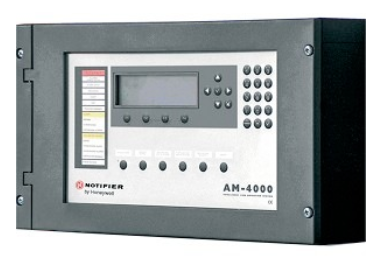Difference between revisions of "Notifier"
(Created page with "The NOTIFIER AM-2000, AM-4000 and AM-6000 are multi-area fire panels. The integration with HSYCO can be accomplished via a standard Modbus RTU slave interface. File:IO Serv...") |
|||
| Line 1: | Line 1: | ||
The NOTIFIER AM-2000, AM-4000 and AM-6000 are multi-area fire panels. The integration with HSYCO can be accomplished via a standard Modbus RTU slave interface. | The NOTIFIER AM-2000, AM-4000 and AM-6000 are multi-area fire panels. The integration with HSYCO can be accomplished via a standard Modbus RTU slave interface. | ||
| − | [[File:IO Server Notifier | + | [[File:IO Server Notifier Panel.png]] |
[[Category:I/O Server]] | [[Category:I/O Server]] | ||
Revision as of 16:51, 18 March 2014
The NOTIFIER AM-2000, AM-4000 and AM-6000 are multi-area fire panels. The integration with HSYCO can be accomplished via a standard Modbus RTU slave interface.
Contents
Communication
The NOTIFIER SIB 600 Modbus interface is required. The default connection parameters are:
Modbus address: 1 (can be set to 1-32)
RS-485 parameters:
| Baud rate | 9600 |
| Data bits | 8 |
| Stop bit | 1 |
| Parity | none |
| Flow control | none |
Refer to the Notifier manuals for installation, wiring and power supply requirements.
HSYCO Configuration
Options
| ID | Default | Values | Description |
|---|---|---|---|
| address | 1 | 1 ... 32 | the panel’s Modbus address |
| gui | true | true | enable support for the UI object, UISET actions and USER commands |
| false | disable UI support | ||
| startupevents | false | true | generate IO events also during the driver’s start-up phase |
| false | start generating events only after HSYCO is aligned with the current status of the system | ||
| pollinterval | 1 | > 0 | set to the highest zone number configured in the panel. Set to 0 to disable zone status polling and control commands |
| lastzone | 150 | 0 ... 150 | set to the highest zone number configured in the panel. Set to 0 to disable zone status polling and control commands |
| loglines | 100 | ≥ 0 | if GUI support is enabled, set to the maximum number of lines to show in the log text object. Set to 0 to disable the GUI log |
Datapoints
| ID | Value | R/W | Description |
|---|
User Interface
Airzone Object
The user interface for the Airzone control framework:
The (airzone) object is listed in the Project Editor’s new object list only when at least one Airzone I/O Server is defined.
Parameters
- server id: the server ID. Supports Redirect variables
- zone: the zone. Supports Redirect variables
- position: the object's position. Use the pixels or rows and columns coordinates format
Syntax
(airzone <server id>; <zone>; <position>)
E.g.
(airzone serverid; zone; x10y20)
UISET Actions
You can use any object that accepts a text attribute, usually text, but also marquee and others, to display the status of the system according to the following table:
USER Commands
The CSx75 I/O Server supports a few system commands to be inserted within the Web interface. The controls are directly supported as ordinary user objects, by setting the name and param fields according to the following table:
| ID | Attribute | Set to | |
|---|---|---|---|
| Name | Param | Action |
|---|
